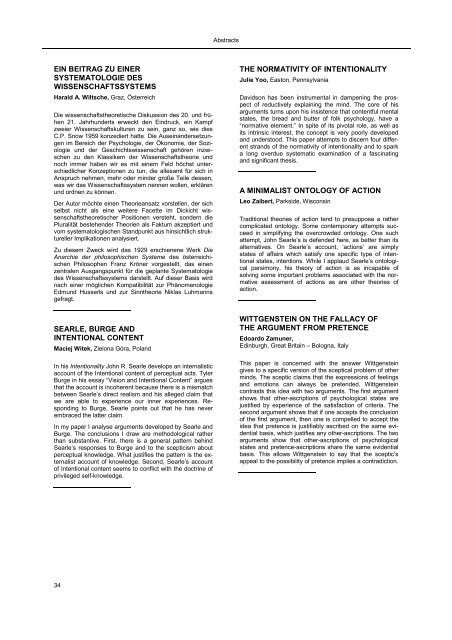Erfahrung und Analyse Experience and Analysis - Austrian Ludwig ...
Erfahrung und Analyse Experience and Analysis - Austrian Ludwig ...
Erfahrung und Analyse Experience and Analysis - Austrian Ludwig ...
Create successful ePaper yourself
Turn your PDF publications into a flip-book with our unique Google optimized e-Paper software.
EIN BEITRAG ZU EINER<br />
SYSTEMATOLOGIE DES<br />
WISSENSCHAFTSSYSTEMS<br />
Harald A. Wiltsche, Graz, Österreich<br />
Die wissenschaftstheoretische Diskussion des 20. <strong>und</strong> frühen<br />
21. Jahrh<strong>und</strong>erts erweckt den Eindruck, ein Kampf<br />
zweier Wissenschaftskulturen zu sein, ganz so, wie dies<br />
C.P. Snow 1959 konzediert hatte. Die Ausein<strong>and</strong>ersetzungen<br />
im Bereich der Psychologie, der Ökonomie, der Soziologie<br />
<strong>und</strong> der Geschichtswissenschaft gehören inzwischen<br />
zu den Klassikern der Wissenschaftstheorie <strong>und</strong><br />
noch immer haben wir es mit einem Feld höchst unterschiedlicher<br />
Konzeptionen zu tun, die allesamt für sich in<br />
Anspruch nehmen, mehr oder minder große Teile dessen,<br />
was wir das Wissenschaftssystem nennen wollen, erklären<br />
<strong>und</strong> ordnen zu können.<br />
Der Autor möchte einen Theorieansatz vorstellen, der sich<br />
selbst nicht als eine weitere Facette im Dickicht wissenschaftstheoretischer<br />
Positionen versteht, sondern die<br />
Pluralität bestehender Theorien als Faktum akzeptiert <strong>und</strong><br />
vom systematologischen St<strong>and</strong>punkt aus hinsichtlich struktureller<br />
Implikationen analysiert.<br />
Zu diesem Zweck wird das 1929 erschienene Werk Die<br />
Anarchie der philosophischen Systeme des österreichischen<br />
Philosophen Franz Kröner vorgestellt, das einen<br />
zentralen Ausgangspunkt für die geplante Systematologie<br />
des Wissenschaftssystems darstellt. Auf dieser Basis wird<br />
nach einer möglichen Kompatibilität zur Phänomenologie<br />
Edm<strong>und</strong> Husserls <strong>und</strong> zur Sinntheorie Niklas Luhmanns<br />
gefragt.<br />
SEARLE, BURGE AND<br />
INTENTIONAL CONTENT<br />
Maciej Witek, Zielona Góra, Pol<strong>and</strong><br />
In his Intentionality John R. Searle develops an internalistic<br />
account of the Intentional content of perceptual acts. Tyler<br />
Burge in his essay “Vision <strong>and</strong> Intentional Content” argues<br />
that the account is incoherent because there is a mismatch<br />
between Searle’s direct realism <strong>and</strong> his alleged claim that<br />
we are able to experience our inner experiences. Responding<br />
to Burge, Searle points out that he has never<br />
embraced the latter claim.<br />
In my paper I analyse arguments developed by Searle <strong>and</strong><br />
Burge. The conclusions I draw are methodological rather<br />
than substantive. First, there is a general pattern behind<br />
Searle’s responses to Burge <strong>and</strong> to the scepticism about<br />
perceptual knowledge. What justifies the pattern is the externalist<br />
account of knowledge. Second, Searle’s account<br />
of Intentional content seems to conflict with the doctrine of<br />
privileged self-knowledge.<br />
34<br />
Abstracts<br />
THE NORMATIVITY OF INTENTIONALITY<br />
Julie Yoo, Easton, Pennsylvania<br />
Davidson has been instrumental in dampening the prospect<br />
of reductively explaining the mind. The core of his<br />
arguments turns upon his insistence that contentful mental<br />
states, the bread <strong>and</strong> butter of folk psychology, have a<br />
“normative element.” In spite of its pivotal role, as well as<br />
its intrinsic interest, the concept is very poorly developed<br />
<strong>and</strong> <strong>und</strong>erstood. This paper attempts to discern four different<br />
str<strong>and</strong>s of the normativity of intentionality <strong>and</strong> to spark<br />
a long overdue systematic examination of a fascinating<br />
<strong>and</strong> significant thesis.<br />
A MINIMALIST ONTOLOGY OF ACTION<br />
Leo Zaibert, Parkside, Wisconsin<br />
Traditional theories of action tend to presuppose a rather<br />
complicated ontology. Some contemporary attempts succeed<br />
in simplifying the overcrowded ontology. One such<br />
attempt, John Searle’s is defended here, as better than its<br />
alternatives. On Searle’s account, ‘actions’ are simply<br />
states of affairs which satisfy one specific type of intentional<br />
states, intentions. While I applaud Searle’s ontological<br />
parsimony, his theory of action is as incapable of<br />
solving some important problems associated with the normative<br />
assessment of actions as are other theories of<br />
action.<br />
WITTGENSTEIN ON THE FALLACY OF<br />
THE ARGUMENT FROM PRETENCE<br />
Edoardo Zamuner,<br />
Edinburgh, Great Britain – Bologna, Italy<br />
This paper is concerned with the answer Wittgenstein<br />
gives to a specific version of the sceptical problem of other<br />
minds. The sceptic claims that the expressions of feelings<br />
<strong>and</strong> emotions can always be pretended. Wittgenstein<br />
contrasts this idea with two arguments. The first argument<br />
shows that other-ascriptions of psychological states are<br />
justified by experience of the satisfaction of criteria. The<br />
second argument shows that if one accepts the conclusion<br />
of the first argument, then one is compelled to accept the<br />
idea that pretence is justifiably ascribed on the same evidential<br />
basis, which justifies any other-ascriptions. The two<br />
arguments show that other-ascriptions of psychological<br />
states <strong>and</strong> pretence-ascriptions share the same evidential<br />
basis. This allows Wittgenstein to say that the sceptic’s<br />
appeal to the possibility of pretence implies a contradiction.












